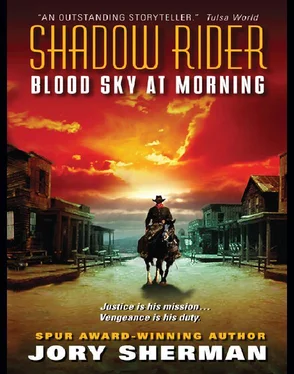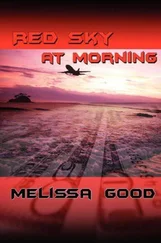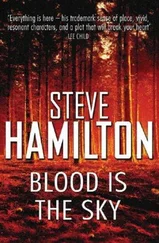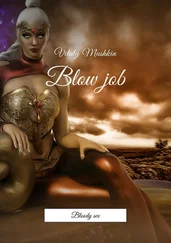“Yes.”
“What’s his name?”
“Zak Cody,” Jeffords told him. “And he is under orders from General Crook.”
“Army?”
“I don’t know. Once, I think. You better just forget you ever saw him in Cochise’s camp. I think he’s under secret orders from Crook and from President Grant.”
Ted had let out a low whistle of surprise. Though he wanted to know more about Zak Cody and his mission, he’d asked no more questions of Jeffords.
Now, Ted opened one eye and stared at Cavins, then shifted his gaze to the shaft of moonlight streaming through the window. The light seemed placid and steady, but it was swirling with dust motes and air, and when he shifted focus, he could see only the light itself. But when he refocused, the motes twirled like tiny dervishes gone mad, with no apparent pattern to their movements. In that moment before he closed his eyes, he compared the vision to Trask’s incomprehensible mind. Somewhere in that brain of his, Trask was scheming and planning.
Ted vowed that he would be patient and learn that secret. He just hoped that he would live that long and beyond that discovery. Trask was a dangerous man, and cunning, as a wolf or a fox is cunning, and he knew he must be careful. Very careful.
Finally, he fell into a restless sleep, dreamless except for shadowy shapes that flitted through the darkness of his mind, indefinable, featureless as dark smoke in a darkened room.
He was awakened by the sound of boots stalking across the floor, and when he opened his eyes, he saw a man shaking one of the stage drivers.
“Time to get up, Cooper,” a voice said, and the bearded man on the bunk rose up and rubbed his eyes.
“Shit,” the driver said, “it’s dark as a well-digger’s ass.”
“And you got a run to Yuma, Dave.”
Cavins had fallen asleep in his tilted chair and he blinked in the low light from the lamp over his head. His paper book had fallen to the floor and lay there like a collapsed tent, open to the page he’d been reading.
Outside, Ted heard the creak and jingle of harness, the snorting of horses, and the low, gravelly voices of men speaking both Spanish and English. The moon had set, or had drifted beyond the window over his bunk. His back was soaked with sweat and his flesh itched under the leather straps.
Trask entered the bunkhouse.
“Cavins, go get some grub,” he said.
The other driver woke up, adjusted his suspenders and walked outside to visit the privy. Trask and Ted were alone in the room.
“We’ll get those straps off you pretty soon, O’Hara.”
Ted just glared at him.
Trask smiled.
“We’re going to use your map today. You’re going to take us to those places you marked.”
“Apaches move around a lot,” Ted said. “They could all be gone by now.”
“That would be your tough luck, Lieutenant. But I want to ask you something, and it’s just between you and me, okay?”
Trask picked up a chair and set it by Ted’s bunk. He sat down and leaned over so his voice would not carry.
“Go ahead, Trask. You have me where you want me.”
“Patience, patience. Only a little while longer. We’ll get some breakfast for you, some hot coffee and you’ll be good as new.”
Ted sighed, resigned to being bound awhile longer.
“What do you want to know?” he asked Trask.
“When you and your company were checking on the Apaches out there, did you find out where they keep their gold?”
Ted stiffened. “Gold?”
“Yeah. We know they been hiding it somewheres. You must know where they keep it. You tell me.”
Now he knew what Trask was really after. Apache gold. There had been rumors of it at the post and in Tucson. He’d never paid much attention to the talk. But now he knew that Trask believed the rumors and he wanted what he thought the Apaches had.
He also knew that his life depended upon his answer to Trask.
He felt as if he were in a roomful of hen’s eggs, and if he made a wrong step, he would break those eggs and Trask would have no further use for him. He let the answer form in his mind, take shape, harden into what had to sound like truth coming from his mouth.
Trask’s breath blew against his face, hot and smelling of stale whiskey and strong tobacco.
Ted closed his eyes and opened them again.
Trask was still there, leaning close to him, waiting for his answer.
And Ted’s throat was full of gravel, and his gut had tightened with fear and uncertainty.
Trask waited for his answer, a cold look in his pale, steely eyes.
Chapter 15
Cloud shadows grazed across the land like the lingering and bewildered shades of sheep. Buttes and mesas stood like the hulks of rusting ships lost on a long ago sea, and the sun blazed down on it all with an unrelenting fire that would bake a lizard’s blood. Carmen’s face sweated under the brim of her straw hat and no amount of fanning with her hands would push cool air through her mouth and nostrils.
The wagon tracks were dim now, but still visible on the baked sand, like snake tracks turned to fossilized impressions by centuries of sun compacted into a single searing moment. Chama sniffed the air as if seeking a vagrant breeze that might cool his face, dry the sweat soaking from his hairline into his eyes and staining his shirt under his armpits.
Zak worried a small pebble in his mouth, spat it out as he rode up alongside Carmen, who was riding between the two men, Jimmy in the lead, Zak following in the rear.
“You’ve been to the next station,” he said to her. “Know who’s there?”
“Why should I tell you anything, gringo?”
“Because I asked you with politeness, Carmen.”
“Phaa,” she spit, but she could not produce a drop of saliva. “You take me prisoner, make me ride in the hot sun, and you say you are polite? You are ladrón , a thief. My husband will kill you as he would kill a cockroach.”
“So much killing,” he said, half to himself.
“Yes. You. You kill. Cabrón. ”
“ Verdad, ” he said. “True.”
“And so, you too will die. By the gun.”
“I knew a man,” Zak said, “who taught me much. He was a Lakota. An Ogallala.”
“I do not know what that is. Indio ?”
“Yes. He was an Indian. His name was Two Hawks. We were watching the dances. He told me that when the people danced, they held hands. They formed a circle. He said that was to show that all people are connected to one another. That we are all the same, in spirit.”
“We are not all the same. I am Mexican. You are gringo, norteamericano, ” she spat as if the very words left a bad taste in her mouth.
Zak looked at her and felt pity.
In her eyes, and in the lines on her face, he saw centuries of suffering and pain. He saw the Yaqui blood beneath the skin on her cheekbones, the faint glow of vermillion smeared across the high planes, the ancient bronze of Moorish ancestors in the cast of her jaw, and the black coals of Spanish mothers so sad and haunting in her eyes.
He thought that she must have been pretty once, as a girl is pretty. With a sweet, smiling face, good white teeth, soft locks of shiny black hair. Now, the years had taken their toll. She was no longer a pretty young girl. But she was a beautiful woman, in the way that old, polished wood is beautiful, in the way a gnarled, wind-blasted tree on the seacoast is beautiful.
“You have the Indian blood in you?” she said after a while. “You do not look it.”
“Yes.”
“Your mother?”
“Yes.”
“But not full blood?”
“No, not full blood,” he said.
“That is why you do not show the Indian face of your mother,” she said, and he wondered what she was thinking, through that labyrinth her reasoning took her from, that simple black and white place she had come from long ago and journeyed through over so many years.
Читать дальше












